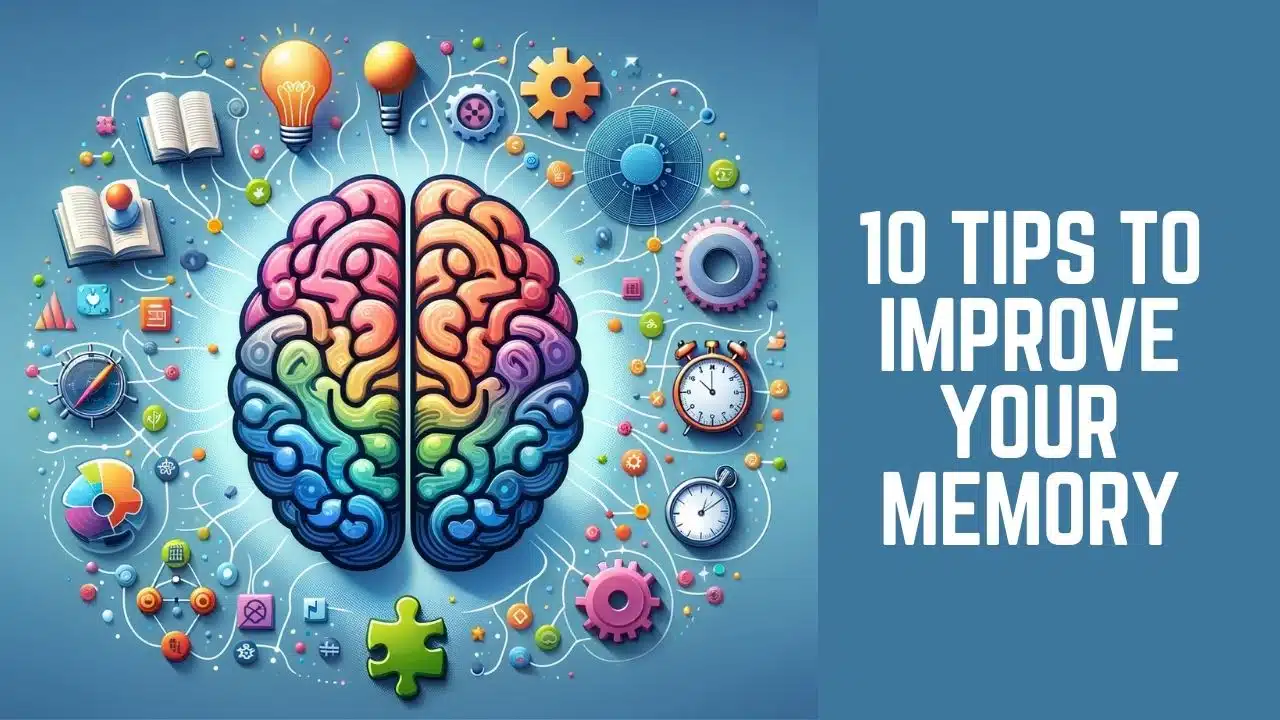A good memory is crucial for daily functioning and long-term success. We rely on our memory for everything, from remembering where we put our keys to learning new skills at work. The good news is that memory can be improved at any age through lifestyle changes and mental exercises. Building memory isn’t necessarily about memorizing more information quickly; it’s about strengthening the pathways in your brain through repetition and association.
This article provides 10 science-based tips to boost your memory, backed by the latest research. Whether you want to ace an exam, give presentations without notes, or simply remember names better, incorporating a few of these easy techniques into your routine can go a long way.
Content Highlights
- Meditate daily to lower stress hormones that impede memory formation. Aim for 10–15 minutes a day.
- Get at least 7-9 hours of quality sleep nightly for optimal memory consolidation.
- Exercise regularly to promote neuroplasticity and boost cognitive performance.
- Nutrients like healthy fats, antioxidants and omega-3s provide the raw materials for better memory function.
- Learn new skills to continually build neural connections and cognitive reserve.
Use mnemonic devices and cues to associate unfamiliar information with things you already know. - Break larger concepts down into digestible chunks of 4–7 pieces of information at a time.
- Frequently test yourself and revisit tougher concepts daily through active recall.
Make connections between novel ideas and existing frameworks in your long-term memory. - Engage multiple senses simultaneously; visualize, listen, write and apply information for reinforcement.
1. Meditate to Reduce Stress
Chronic stress and elevated cortisol levels negatively impact memory and learning. Research finds that meditation helps lower stress and anxiety levels, which allows your brain to consolidate and store memories more efficiently.
Aim for at least 10 to 15 minutes of meditation per day. Focus on your breath, silently repeat a mantra, or visualize a peaceful scene; this can regulate your fight-or-flight response over time. You can also try yoga, deep breathing, going for nature walks, or journaling to mitigate daily stress.
2. Get Plenty of Quality Sleep
Lack of sleep hampers your ability to focus and retain information. Sleep is necessary for memory consolidation, allowing the brain to strengthen neural connections and transfer short-term memories into long-term storage.
Adults require 7-9 hours of quality sleep per night. Establish a regular sleep-wake cycle, limit screen time before bed, avoid caffeine late in the day, and create a restful environment for better rest. Getting enough sleep ensures you wake up feeling refreshed and ready to memorize anything.
3. Exercise regularly
Regular cardiovascular exercise promotes neuroplasticity by increasing blood flow and releasing memory-boosting hormones in the body and brain. As little as 20–30 minutes per day can vastly improve cognitive abilities.
Aim for a mix of endurance activities like brisk walking, jogging, swimming, and cycling, along with strength training. Additionally, coordinated activities like dance and racquet sports allow you to memorize movement patterns, which doubles up as a mental workout. Just like muscles, keep your memory faculties strong through regular training.
4. Follow a Healthy, Balanced Diet
Nutrition directly impacts the brain’s structure and ability to function. Refined carbohydrates, added sugar, and unhealthy fats can cause energy crashes and inflammation, limiting your memory capacity. Whereas antioxidants in fruits, vegetables, nuts, and fatty fish support memory formation.
Eat more greens, berries, avocados, mushrooms, seeds and omega-3s for better memory retention. Stay hydrated, as dehydration causes mental fatigue. Allow your brain to run optimally by providing the right fuel through a balanced, low-glycemic diet.
5. Learn a New Skill
When you challenge your brain to gain new knowledge, you create and strengthen neural connections, building your memory reserves. Learning a new language, instrument or skill literally changes your brain structure over time.
Dedicate 30 minutes per day towards learning something new. For example, rehearse vocabulary words, memorize chords on a guitar, or even memorize the names of vegetation in your neighborhood. As you immerse yourself and repeatedly practice these skills, retaining information gets easier. Stay mentally active and curious.
6. Use mnemonic devices
Mnemonic devices are clever memory techniques that allow you to associate information with visuals, sounds, meanings or connections to enhance recall. Rhymes, acronyms, codes, phrases, images and spatial navigation can allow you to memorize almost anything through patterns and cues.
Come up with fun, exaggerated mnemonics that specifically trigger your memory. For a shopping list, imagine each product dancing in a conga line or assigning personalities to remind you what to buy. The quirkier, the better, as bizarre associations get engraved more strongly. Use apps like Anki to create effective mnemonics.
7. Break Up Information Into Chunks
When trying to memorize large amounts of information, break it up into manageable pieces, or ‘chunks’. Our working memory can retain about 4–7 pieces of information at once. Segment what you need to remember into bite-sized chunks.
For memorizing speeches, categorize topics into broader ideas, themes or chronologies. Learn a few lines per section before piecing all paragraphs together. For remembering long numbers, split digits into groups of three or four. Chunking streamlines facts, formulas, languages and more into memorable segments.
8. Quiz Yourself and Revise
Instead of simply re-reading material, actively recall and test yourself through self-quizzing. Retrieving information strengthens the neural pathways etched in your brain, reinforcing memory over time.
Create flashcards, leave voice memos, set phone reminders or test your partner. Challenge yourself by answering questions without references; this engages more brainpower. Revisit tougher concepts daily over a span of weeks until they stick. Repeated recall combined with testing boosts both short- and long-term retention.
9. Connect with Concepts You Already Know
Linking unfamiliar concepts with existing information in your long-term memory exponentially saves time and energy while retaining new subject matter. This method builds schemas—frameworks representing interrelated concepts.
If learning about new countries, relate details to places you’ve already been to, historical events you know about, or even cultural trivia that has overlapping contexts. For science formulas, connect mathematical expressions to proven equations. Bridge gaps between known ideas and novel information for stickier memory encoding.
10. Engage Multiple Senses
Experiencing information across visual, auditory, and kinesthetic channels strengthens memory processing and retrieval via multiple neural paths. The more sensory details available, the more anchor points your mind can access later.
When possible, listen, watch, write, repeat and apply knowledge simultaneously. For instance, learn a new piece on guitar by reading music, watching finger placements, listening to melodies and practicing the actual movements together. Layered sensory inputs boost encoding and cement memories for the long term.
Conclusion
Building a strong memory equips you to achieve personal and career milestones more effortlessly over time. Incorporate the memory-boosting techniques listed here consistently, and track improvements through daily practice. Besides these practical tips, keeping a positive mindset fuels motivation, allowing you to memorize anything you set your mind to!
The next time you misplace an important document or struggle to recall an acquaintance’s name, cut yourself some slack. Memory lapses are completely normal. Redirect your attention to exercising your memory muscles through healthy lifestyle habits that sharpen your mind over time. Patience and perseverance are key to improving cognitive abilities at any age.
Discover what works best for your unique learning style. Mix and match visual, auditory and kinesthetic memory tools to create an effective routine. Maintain realistic expectations; building memory is an ongoing process. Over time, you will notice that remembering grocery lists, presentation talking points and even foreign vocabulary gets easier with deliberate practice.
Frequently Asked Questions
1. Is photographic memory real, and can we develop it?
Photographic or eidetic memory is a misconception, and there is no evidence of a human with a perfect visual memory. However, with meticulous training and systematic recall techniques like mnemonics, we can develop skills like expert memorizers have showcased.
2. Can a person with average intellect strengthen their memory?
Yes, people of all levels of intelligence can absolutely improve their memory. It’s about employing proven tools tailored to your learning style and consistently practicing recall with focused effort. Genetic advantages may vary; your dedication to memory training determines outcomes.
3. Why do I sometimes forget what I just read a few seconds ago?
Our attention spans can easily waver as we read text. Ensure you minimize distractions, actively read aloud or take handwritten notes to reinforce retention. Our working memory capacity is also quite limited, so continually reviewing concepts connects them with existing information for storage.
4. What exercises are most effective for strengthening memory?
A combination of endurance and high-intensity interval training for at least 20–30 minutes per day boosts blood circulation and releases hormones that benefit memory. Coordinative physical activities like dance or table tennis make you memorize and recall movement patterns, serving as a dual mental exercise.
5. How can memory decline be prevented with age?
Engaging in intellectually stimulating activities, learning new skills to build cognitive reserve, reducing stress levels through relaxation practices, following a nutrient-rich diet, and staying socially active can help maintain memory and prevent cognitive decline.







































